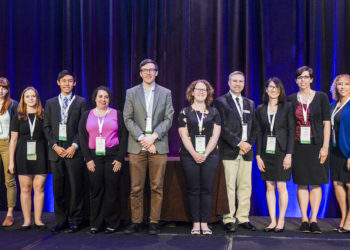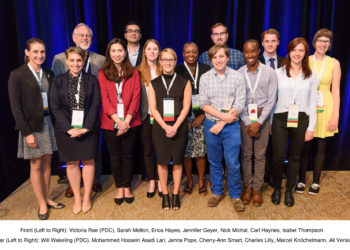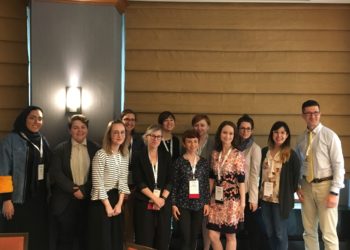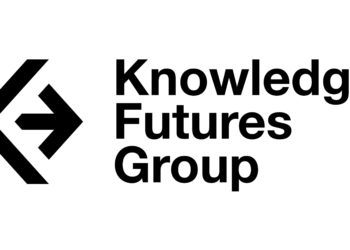In what has become an annual tradition, below we ask this year’s winners of the Society for Scholarly Publishing’s (SSP’s) Fellowships for their impressions of the SSP Annual Meeting. For those of us who are regulars around the publishing meeting circuit, it’s always informative to hear from someone who is seeing the meeting with fresh eyes. And so we asked the SSP Fellows, what did you learn at this year’s SSP Annual Meeting and what surprised you the most?
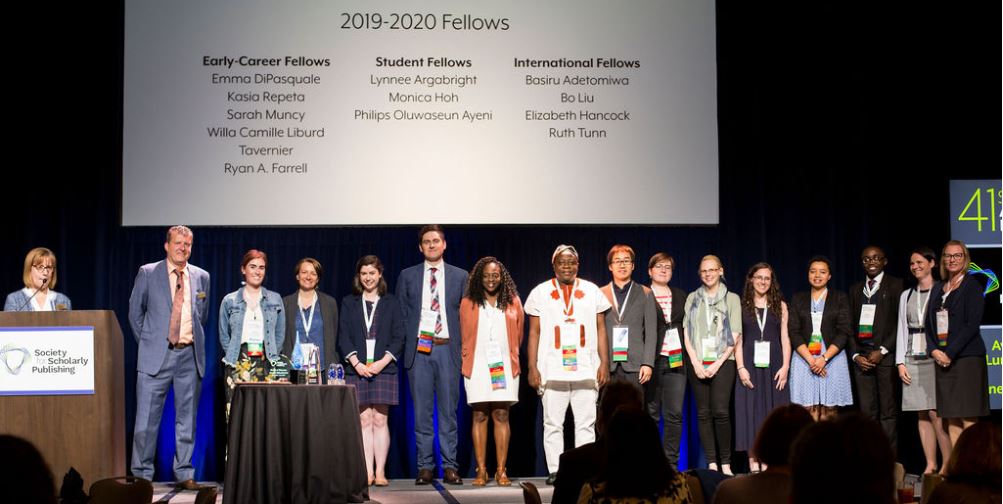
Early Career Fellows
Willa Camille Liburd Tavernier (Indiana University Bloomington, USA): My first SSP Annual Meeting did not disappoint! The conference theme “Global Perspectives in Scholarly Publishing”, was an immediate draw. In her opening keynote, Dr. Mariamawit Yeshak spoke from her heart about the exclusion of traditional knowledge from scientific research and publishing. The disappearance of traditional knowledge of food and healing is something close to my heart, but I never thought of its connection to scientific knowledge and publishing, so this gave me an entirely new perspective. Dr. Yeshak also gracefully allowed me to sit and speak with her at length during the networking reception which followed, which was an invaluable experience. I also really enjoyed connecting with my mentor, and starting to make plans for the coming year.
As the Open Scholarship Diversity Resident Librarian at IU Bloomington, I looked forward to hearing practical strategies for open access to scholarly work. I got some great takeaways from the meeting and was particularly interested in the Subscribe to Open (S2O) concept presented by Annual Reviews, which incorporates the core library values of openness and transparency, and also the value of choice. The importance of choice is embedded in institutional open access mandates, which typically allow for opt-outs. S2O essentially puts the decision in the hands of subscribers, on an annually recurring basis, whether to use their subscription dollars to sustain open access to each publication — subscribers, therefore, take ownership for their actions and its impact.
It also forces vendors to think critically about whether they want customers who don’t share their values. Ann Michael of Delta Think [now Chief Digital Officer for PLOS] spoke about lessons learned during the S20 drive for their data analytics product, during which a customer opposed S20 because the customer wishes to retain an advantage over those who cannot pay subscription fees.
I also learned about emerging initiatives and products such as RA21 authentication, Abeni Wickham’s SciFree AB platform for direct dynamic research dissemination, and Code Ocean, which allows users to share and run computer programs without having to download or install them on their machines. Fun fact — I learned about Code Ocean walking to the meeting when I almost got run over by a scooter rider! Travis Hewgley from Code Ocean witnessed the entire mishap — we struck up a conversation and the rest is history.
Finally, what surprised me most about the SSP Annual Meeting was the food — it was so good, possibly the best conference food ever!
Emma DiPasquale (Michigan Publishing, USA): As was the case with every new conference I attended this year, I wasn’t sure what to expect. What surprised me the most about the SSP meeting was the group it brings together: societies, publishers, libraries, institutions, vendors, and data repositories. Having the opportunity to discuss so many fresh perspectives and innovative ideas was incredibly helpful and provided a deeper understanding of the broader scholarly publishing landscape. I learned the importance of actively seeking out perspectives from folks who may fall outside of what I used to consider my immediate community for my digital publishing platform, Fulcrum. I was surprised by the themes I recognized in presentations and conversations: community and sustainability. These resonated with me in particular given my role as a community manager, which has offered me the opportunity to think about not only how to grow a community and community-centered product, but how to make that community and product sustainable. I wrestled with questions about what this means and how we as a society can collaborate to achieve more shared goals: does each publisher have to limit our focus to solving one particular problem? How can we find more spaces for conversation about collaboration and shared community growth? How do we consider the many voices of our community in our governance, our development roadmaps, our strategic approaches?
In a Friday afternoon session entitled “Community Approaches in Scholarly Communications,” the first slide asked what is meant by community. The panelists posed a simple definition: a group of people who come together with a shared purpose. By attending this conference, I realized a critical purpose of our society is identifying and pursuing a shared purpose: our commitment to empower our members to guide the development of scholarly publishing at large. Coming back to my organization after the annual meeting, I know I have not only discovered a critical network of colleagues to consult, but a larger community through which to improve and clarify this purpose. I am grateful to have gained these perspectives and for the lesson that we must continually ask hard questions and push ourselves to create the best possible publishing environment.
Kasia Repeta (Duke University Press, USA): I found the SSP Annual Meeting to be a great opportunity not only to learn about the publishing industry or to get helpful context for the decisions that are made within the publishing industry and my own organization, but also as a very important space for networking. The fellowship award included an invitation to participate in pre-seminar workshops, which I found very engaging and beneficial. Participating in robust discussions about critical and emerging issues impacting scholarly communication and working on common tasks during the pre-seminar workshops allowed me to break the ice and introduce myself to many members of the society, including the fellowship awardees, as well as to some of the Scholarly Kitchen Chefs whose work I highly appreciated. I also had a chance to talk to some of the technology vendors’ representatives exhibiting their products and services in the marketplace hall.
During the meeting, I enjoyed learning about initiatives to drive change in international representation among scholars. I gained new knowledge by participating in sessions where topic experts presented their perspectives on diversity and inclusion, talent development, and community building. I had a chance to join a very interesting session where researchers, both from STEM and social science fields, talked about their current publishing experience, the relevance of peer review, the shifting importance of preprints, and ongoing debate on open access as well as research evaluation measures.
What surprised me positively was the atmosphere of openness for learning and hearing other perspectives that came from both the experienced topic experts and early career members. For example, I had a wonderful chat with one of the keynote speakers, Betsy Beaumon from Benetech, about why website accessibility matters for inclusion. This conversation, like many others, allowed me to learn and share my own creative perspectives and I found this experience extremely positive.
I’d like to mention the importance of the SSP Mentorship Program that has helped me to broaden my perspectives within the publishing industry. I am grateful to my past mentors, Liz Allen from Annual Reviews and Yael Fitzpatrick from Gazelle Design Consultancy, and to all my colleagues from Duke University Press, especially Jocelyn Dawson, Journals Marketing Manager, and Cason Lynley, a Director of Marketing and Sales, for supporting my everyday work and professional development.
Sarah Muncy (University of Cincinnati Press, USA): I came to SSP without specific expectations but with a strong desire to absorb as much information as I could about the areas of scholarly publishing I do not often encounter — namely publishing procedures (such submission guidelines and peer review) and technology in the science industry outside of the university setting. In my current position, concerns about accessibility, especially in higher education, are increasingly important to publishers, educators, researchers, and students. I came to SSP with the goal of taking part in discussions about accessibility and to gauge the type of results publishing efforts are striving to produce. I attended the pre-meeting seminar with OASPA and tailored the other panels I attended with a focus on these subjects. I learned how closely intertwined accessibility and availability are, and that discussions about shifts to open access have as much to do with paywalls as making scholarly content accessible to people of all types and abilities. Rife with concerns and complexities, open access movements are altering the landscape of scholarly communications and feed a debate on the extent to which these open access initiatives align the industry with digital expectations. I was encouraged by the conversations I was a part of and the presentations I attended that addressed these changes. Not only did I get a crash-course on open access from individuals across the spectrum in their level support of open access mandates, but I also saw how crucial community and communication are to the fabric of SSP. Today the concern is Plan S, tomorrow it may be something else, but the continued dialogue between SSP participants from such a wide breadth of areas in scholarly publishing is reassuring.
SSP’s conference was quite large, so I am grateful for the SSP Fellowship program for pairing each of us with a mentor, making the whole process and the exhibitor’s hall far less intimidating. As a relative newcomer to scholarly publishing world working for a small university press, I was encouraged to find the industry and all its components are far larger than I had imagined, and are making great strides in broadening the reach of scholarly publishing to general and academic audiences. In a few days, I met so many people and learned so much about the industry, and I am excited to return home and relay my experience to my colleagues and apply my new knowledge to my work. Thank you SSP for seeing the value in supporting early career professionals both at the annual meeting and beyond.
Ryan Farrell (American Gastroenterological Association, USA): The practicable information imparted during the 2019 SSP Annual Meeting was, of course, manifold. This experience was all the more memorable given my inclusion in the cohort of Early Career Fellows. Looking back on this whirlwind week, here are some of the takeaways that feel most immediate to me:
- The pre-meeting “Journals Management Workshop” was an opportunity to interact with interested peers from fellow societies, university presses, libraries, editorial service providers, and commercial publishers. The common experiences and contrasting opinions on topics such as fostering engagement from the editorial board, making peer-review more efficient and impartial, and supporting data sharing and integrity will certainly impact my day-to-day.
- SSP’s commitment to diversity was manifest throughout the meeting, both among attendees and the organization’s governance. The keynote from Dr. Mariamawit Yeshak on scholarly publishing in Africa was a necessary call to action for our industry and its efforts to promote a broader public good. Betsy Beaumon’s keynote on better serving users who may not be accessing content via traditional means was equally informative and critical. Those who followed #SSP2019 on Twitter saw this dedication reflected in the warm reception of the “Inviting New Voices” panels. Moreover, it was wonderful to see the appointment of the Diversity, Equity, and Inclusion Committee and, as incoming co-chair of the Early Career Subcommittee, begin contemplating possible synergies.
- Depending on the professional circles you travel in, the announcement of the Plan S revision may have been surprising. Alison Mudditt’s superb summary, in addition to the myriad individual conversations taking place throughout the meeting, will certainly serve as food for thought from now until 2021.
- Digital tools – from artificial intelligence and machine learning to blockchain and decentralized identity – remain as loci for disruptive innovation, but I was heartened by the degree to which panelists and attendees were circumspect about their application. Specific responses varied but shared a common emphasis on community building, responsible growth (i.e., automating tasks not jobs), and identifying specific needs rather than simply flocking to tech for its novelty.
Perhaps the most pleasant surprise was the undeniable sense of authentic community fostered by SSP governance, panelists, and members. As a managing editor, my work oftentimes feels rather solitary. My participation in this year’s meeting will certainly prove a motive force for continued pursuits in the industry and an incentive to give back to a community that’s provided me with so much.
Student Fellows
Philips Oluwaseun Ayeni (McGill University, Canada): Being a first-time attendee in a relatively new conference focus, I am thrilled with the level of intellectual discussion on issues in scholarly communication and publishing. The enthusiasm shown by publishers, practitioners, technocrats, researchers, and participants was commendable. The inclusive and diverse nature of topics in pre-meeting seminars and all concurrent sessions shows that the SSP community is at the forefront of the emerging technologies, global trends, policies, and perspectives on publishing issues. Networking breaks, lunches. and the exhibitor’s marketplace spiced up my experience at the conference.
As a researcher who is keen on emerging trends and global perspectives on open access, I was thrilled with the level of support “Subscribe to Open” (S2O) of Annual Reviews has received. While there is yet to be a consensus open access funding model across all institutions, the S2O model stands out as a viable alternative based on positive feedback in sessions where open access discussions were held. Although, other funding models such as the “Transformative Agreements” (PAR/RAP) present their own strengths and opportunities, they have been criticized for imposing funding expenses on library institutions which their dwindling budgetary allocations may not sustain. Furthermore, it is intriguing to learn about several mind-boggling innovations focusing on making publishing and related processes an incredible experience for authors and publishers. As a PhD student, I was thrilled with innovations such as “Authorea”, “In Review”, “Paper Digest” among others. According to Alberto Pepe, Authorea enables researchers to publish their pre-prints, code, notes, and visualizations and get credit for their works. It removes format restrictions confronting authors, presenting a viable platform for publishing scholarly discoveries that are not in traditional article formats. This tool has been commended for enhancing collaborative writing. Similarly, the award-winning Paper Digest which uses artificial intelligence to summarize key findings in articles will be an invaluable companion for researchers, achieving increased productivity and efficiency at reduced efforts.
Participating in this year’s annual meeting has bolstered my confidence and knowledge base needed to inform policy makers, administrators and funders on issues confronting our collective responsibility in navigating the scholarly communication world. This meeting has inspired me to advocate for open access policies, models, and innovations that are economically viable and sustainable. If we truly desire a world of open science and unrestricted access to knowledge, then all voices must be heard.
Monica Hoh (University of Illinois at Urbana-Champaign, USA): The first day of the annual meeting, someone asked if this was like many conferences that I’d been to before. When I shared that not only was this my first publishing conference, it was also my first conference ever, they said that I had hit the jackpot of conferences and was starting at the top…and honestly I have to agree.
As the fellows prepped for the annual meeting, I found out that students only make up 1% of the membership for this society. However, any fear that I might not belong quickly faded as people eagerly included me in their conversations. Everyone was so welcoming and open, creating a community that newcomers like myself are eager to join. I was really impressed by how these professionals engaged with each other. While yes, they are competitors, everyone came together to critically engage with new challenges in the world of scholarly publishing.
I can’t possibly talk about everything that I learned throughout the meeting, but I’d like to point out the keynote speakers that spoke at this year’s meeting. Our opening keynote speaker, Dr. Mariamawit Yeshak, quoted a mentor of hers who told her that if her research isn’t something that she wanted to share with her grandmother, it’s probably not worth doing. This was not to say that you have to sit down with your grandmother for every research project, but that research shouldn’t be done for the sake of research, but as service to the public. As a library science student, public service is a large part what we claim as our profession’s goal. As Betsy Beaumon added her own words about accessibility in Wednesday’s keynote, I realized that we also need to commit to centering our focus on accessible practices, instead of treating accessibility standards as an afterthought. Thinking more broadly about education, we should be normalizing accessibility standards in any subject. In challenging students to work within the bounds of accessible practices, we will soon see how much creativity exists while adhering to standards.
The work that we do needs to focus on accessibility, relevancy, and usefulness to our public. What good is information that no one can access or finds useful? The commitment that I saw at SSP toward improving the field on these two points was encouraging, and I’m excited to see how things will continue to change in the coming years.
Lynnee Argabright (University of North Carolina at Chapel Hill, USA): I wanted to begin by saying my favorite session was the pre-seminar workshop because it erased all the concerns I was feeling about my value at SSP. We were to have table-wide discussions about the Charleston Conference trends. As part of the table, I realized my voice was equally valid to everyone else’s, and the points I brought up were well received. We talked about the future impacts of current events and trends in scholarly publishing, and how if we recognize possible future scenarios, we can take actions towardx the better scenarios. What was so unique was the variety of professional backgrounds just within my own table; I felt immediately introduced to a gamut of scholarly communications perspectives, and our voices were not in opposition to each other. Even so, the session reminded us that the desired future scenario may be different for different groups, so we need to consider the individual as well as the collective perspective. Everyone has important perspectives to listen to.
SSP also helped to give me a more inclusive global perspective. I definitely support open access, but I forgot to realize that just because something is available doesn’t mean it is accessible. Was I surprised that much content is unintentionally exclusive just because its published format is not compliant for handicapped readers? Honestly, I was. Did I realize that international researchers may not research components of their culture just because they must reach high research impact? Doesn’t that seem counterproductive? With this wider view, I can work to remind people of these needs, as we collaboratively must influence good scholarship.
Another perspective I was really glad to hear from was the scholars’. Often, their wants don’t seem to match up with ours and we’re not communicating effectively. It was illuminating to learn about how scholars approach research dissemination, with the caveat that their publishing actions may not always reflect their beliefs. They may not want to share their preprints because they risk not getting published due to a data scoop. They may need the high impact scores that paywall journals provide to get the accreditation for grant funding. As discussed in panel sessions, publishers are thinking about how they can make open access more accessible, and preprints more convenient, which is very exciting. Because after all, we have the same mission: help the researchers to make and spread the research.
International Fellows
Ruth Tunn (Edanz Group, Japan): I approached the Annual Meeting excited for the sessions I’d highlighted to attend but steeling myself to endure, rather than enjoy, the overall experience. This was my first big meeting of this type, and I’m an incorrigible introvert and the idea of networking fills me with sick dread. So probably the most surprising aspect of the meeting for me was how much I enjoyed talking to lots of strangers! I guess it’s really not surprising to discover that the scholarly publishing community is awesome, welcoming, and full of fascinating people. And it helped that the meeting was really well organized to welcome newcomers and provide plenty of opportunities to meet people and chat outside of the main sessions. Talking to people and reading the speaker bios opened my eyes to the vast range of roles within the industry (and it was really interesting to hear some of the unexpected career paths people have followed — it seems like a lot of people take the scenic route into publishing, and the community is the richer for it).
I’m a Brit based in Japan working mainly with Japanese and Chinese researchers (in a publication support/author services role), so it was informative to engage with people in the industry from the US and UK. Plan S and funding models are clearly hot topics, with lots of discussion of transformative agreements and read-and-publish. I was coming from a slightly simplistic standpoint in my support of open access; now, although I still firmly believe that the move towards open access is a positive thing, I have a more nuanced understanding of the possible unintended consequences (particularly for small society publishers), and of different routes by which it might be achieved. It was also very interesting to hear directly from US-based researchers about their publishing experiences, their feelings about industry developments such as the rise of preprints, and the difficulties they encounter.
Chinese research and publishing came up as one of the themes in the Charleston trendspotting pre-meeting seminar, and there was discussion during the meeting of the implications of China’s funding strategies and research integrity initiatives. Attendees coming from Asia were definitely in the minority, but it was great to meet a few people from the region and attend a dedicated session on the publishing landscape in China.
I’ve come away from the meeting bamboozled by jetlag but fired up to engage more with the community and work towards building the SSP network in Asia.
Basiru Adetomiwa (Redeemer’s University, Nigeria): There is a famous quote by Catarina Mota, “Acquiring pre-emptive knowledge about emerging technologies is the best way to ensure that we have a say in the making of our future”. This is evident in the factual importance of scholarly publishing in the 21st century. It gives me much pleasure to come across the Society of Scholarly Publishing (SSP) movement. I call it a movement as this represents our collective will to embrace the inevitable future we all must come to. The 41st SSP Annual Meeting held in San Diego has prepared me for a new era of scholarly publishing. With this year’s meeting focused on new voices and new perspectives that help us move together toward a new age of scholarly publishing.
The pre-meeting seminars started with a trend development activity designed to engage attendees in identifying critical and emerging issues impacting the scholarly communication ecosystem. For me, the SSP meeting was an extremely enriching event, I learned about many interesting topics which have made me recognize scholarly communication as a core competency of my chosen profession as a librarian — what a wonderful learning intensive experience. It was my first time attending such an insightful well-packaged program with peer-to-peer dialogue in the vast Pacific City of San Diego.
As a librarian by training, my understanding of scholarly communication is fairly limited, but thanks to SSP for a better understanding of the academic drivers and economic principles that underlie scholarly publishing worldwide, in order to evaluate and provide guidance about opportunities, benefits, and challenges of broader and more open dissemination of scholarship and data. The three day meeting has helped me discover and devise implementable strategies for involving my communities in both understanding and participating in scholarly publishing and the scholarly publishing landscape. It was an exceptional occasion to meet great individuals who do extraordinary things and are passionate about sharing.
What surprised me the most about the SSP meeting as a first-time attendee was the passion of participants to share knowledge, to engage in networking opportunities, hear case studies and tips from peers, and share best practices and challenges. No doubt, this was a truly beneficial meeting for me any my career development. Upon returning home, I will share what I have learned and intend to make a difference in my home communities and others in the profession by initiating activities that will build on the acquired skills and experience. It will in no doubt enhance my advocacy skill as a librarian with an interest in scholarly communication. It will also empower me to mobilize support for the movement in Nigeria and Africa at large.
Bo Liu (SpringerNature, China): My horizon was largely expanded during the SSP Meeting, as I saw such a variety of organizations, as well as people’s roles, in the conference. The most important thing that I learned is that the connection between the publishing industries in the US and China can be strengthened.While the research communities have established strong ties in the past decades, and despite the prosperity in the research output of China, there are many things that could be done, such as research integrity, growing society publishers, training more experienced librarians, etc.
I was most surprised by the culture and the executive capability of SSP as a society. I was deeply impressed by the dedication and connection of the people in the community, how the committees and taskforces work, and the mentorship program in whichI am lucky to participate. All these are helpful for young professionals to learn and grow.
Discussion
4 Thoughts on "Ask The Fellows: SSP 2019 Annual Meeting"
Wow, awesome post Ann and the Fellows, so many great takeaways and perspectives shared, this really puts in perspective what SSP is, and especially what the Fellowship program means to us all, it’s so important to encourage all voices to be heard, and to collectively share knowledge as an open and friendly community … It certainly seems like the 41st Annual Meeting, and all those who helped organize it, did another wonderful job, lifting the bar even higher for next year! thanks again all involved!
This is thrilling. I am so so happy for the awardees. I am even a little envious (smiles). Thanks to this wonderful society. My two colleagues who made your list are so so lucky and good.
What a wonderful post – it represents everything that I love about the SSP community! Thank you all for contributing and for reminding us how lucky we are to be part of it!
I have become so much interested in the SSP Community after listening to the interviews from the award winners. The winners are so so lucky.
